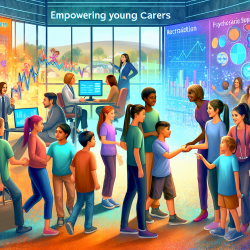Introduction
Young carers are a vital yet often overlooked group within our communities. These adolescents, aged 15-17, provide essential care to family members with disabilities or chronic illnesses, often at the expense of their own well-being and development. The ME-WE Project, a multi-country initiative funded by the European Union, aimed to support these young carers through a psychosocial intervention. This blog post delves into the findings of the ME-WE Project, offering insights for practitioners seeking to improve their engagement with adolescent young carers (AYCs).
Key Findings from the ME-WE Project
The ME-WE Project faced significant challenges in recruiting AYCs, highlighting the need for innovative strategies to engage this hard-to-reach group. The study, conducted across six European countries, revealed several barriers to recruitment:
- Low Awareness: Many AYCs and their families are unaware of the support available to them, making recruitment difficult.
- Social Stigma: AYCs may fear being labeled or bullied, discouraging them from participating in support programs.
- Logistical Challenges: Limited access to transportation and time constraints due to caregiving responsibilities hinder participation.
Despite these challenges, the project successfully recruited 217 AYCs, providing valuable data on effective recruitment strategies and intervention outcomes.
Recommendations for Practitioners
Based on the ME-WE Project's findings, practitioners can enhance their support for AYCs by implementing the following strategies:
- Build Awareness: Collaborate with schools, healthcare providers, and community organizations to raise awareness about the existence and needs of young carers.
- Foster a Supportive Environment: Create a safe space for AYCs to share their experiences without fear of judgment or stigma.
- Utilize Technology: Leverage online platforms and social media to reach AYCs, especially during times of social distancing.
- Flexible Scheduling: Offer interventions at times that accommodate AYCs' caregiving responsibilities and school commitments.
- Engage Stakeholders: Involve former young carers and community leaders in recruitment efforts to build trust and credibility.
Conclusion
The ME-WE Project underscores the importance of targeted, data-driven approaches in supporting adolescent young carers. By addressing the barriers to recruitment and participation, practitioners can create more inclusive and effective support systems for AYCs. These strategies not only improve the well-being of young carers but also empower them to thrive despite their challenging circumstances.
To read the original research paper, please follow this link: Recruitment of Adolescent Young Carers to a Psychosocial Support Intervention Study in Six European Countries: Lessons Learned from the ME-WE Project.










